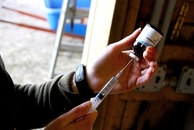
This question was published in Horse and Rider magazine during summer 2016.
My horse is afraid of needles. Someone has told me that I should make him step forwards and backwards constantly when he has to be injected to take his mind off it. Is this a good idea or will this just make him worse?
It is very common for horses to develop needle phobias and this may occur as a result of repeated treatments and/or bad experiences when being injected.
The most important thing to remember is that your horse is likely to be experiencing real fear and this fear can easily become associated with the arrival of the vet and with people touching the areas of his body where he has previously been injected.
Fear is a strong and unpleasant emotion and can increase in intensity rather than improve if it is not handled correctly. The most appropriate way to deal with helping him to overcome his fear is through a careful process of desensitisation and counter conditioning. This means that you desensitise him to all the aspects involved with being injected (two people being present, raising a vein in his neck, pressing something against his vein, etc) and then pair them with something pleasant such as food. By doing this you can alter his emotional response so that he no longer experiences fear when he finds himself in this situation.
Whilst taking his mind off it by moving him backwards and forwards may work in an emergency situation before you have been able to work through the desensitisation and counter conditioning programme it is not a long term solution as all it will do is distract him from what is happening rather than altering his emotional response. Depending on the severity of his fear, attempting to still inject him whilst he is fearful and highly aroused could potentially be very dangerous for both you and your horse and attempting to get him to move backwards and forwards could further escalate his fear and he may become extremely difficult to handle.
When helping a horse to overcome a fearful response that they have developed it is absolutely essential that all the training is done whilst they are below the threshold that makes them frightened as when a horse is very frightened he is unable to learn new tasks easily. I would recommend enlisting the help of a qualified equine behaviourist who can create a personalised desensitisation and counter conditioning programme for you and your horse.
It is also very important to have a friendly, calm and understanding vet who you can explain your problem to as their behaviour around your horse will contribute to the success of your retraining programme. With the appropriate retraining programme from a qualified behaviourist needle phobias can easily be overcome but it is important that you work through a retraining programme well in advance of your next vet visit.
 RSS Feed
RSS Feed
